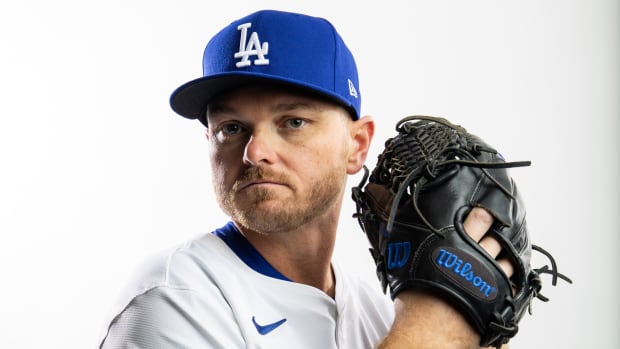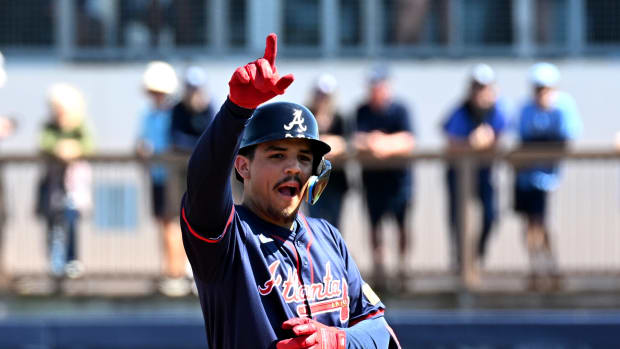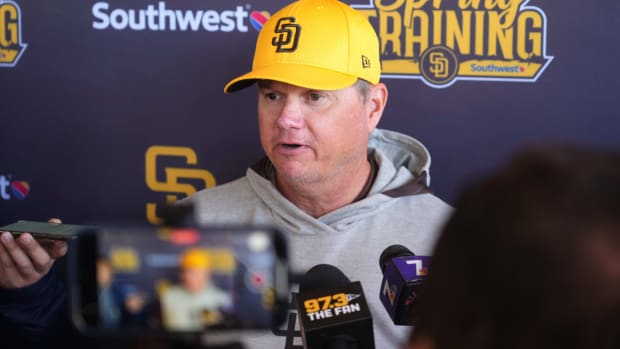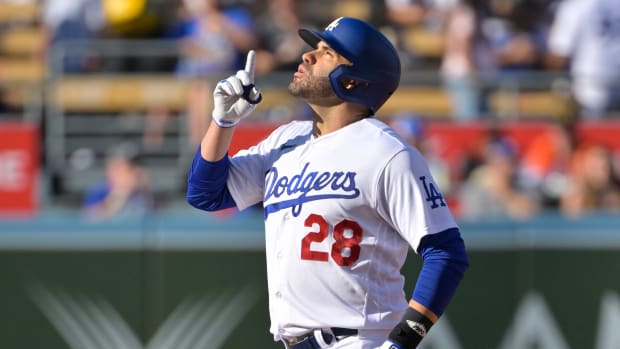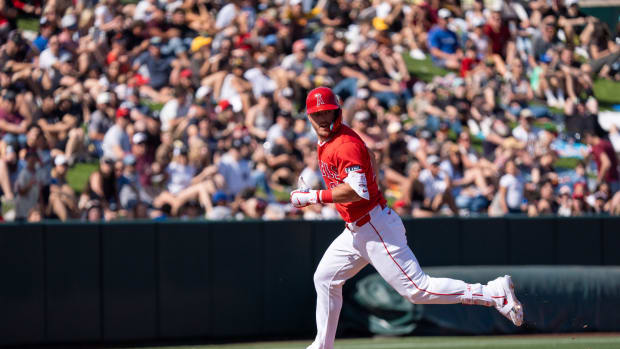Fernandez-Harvey duel recalls drama, impact of classic 1–0 showdowns
Your teams. Your favorite writers. Wherever you want them. Personalize SI with our new App. Install on iOSor Android.
Every day begins with a dawn, but the one on May 25, 1961 seemed bursting with more than the usual dose of possibilities. It would be the day John F. Kennedy, four days before his 44th birthday, delivered one of the most ambitious speeches of his presidency. In his Special Message to Congress on Urgent National Needs, Kennedy vowed to put an American on the moon before the decade was over.
On the same day, two 25-year-old pitchers with losing career records would face each other for the first time. Only 6,878 people bothered to show up at Busch Stadium in St. Louis to watch Sandy Koufax of the Dodgers (40–42 lifetime) pitch against Bob Gibson of the Cardinals (8–11).
Koufax and Gibson, born 51 days apart in 1935, borrowed in their own way from Kennedy’s promise of greatness. Through six innings, they allowed no runs and permitted just seven balls to leave the infield. Then Gibson blinked. He threw a 1–0 fastball to Tommy Davis, the leadoff hitter of the seventh inning, who whacked it over the wall in leftfield. Except for that one pitch, nobody could score off Koufax and Gibson.
It was scriptwriter-fitting that the Special Message—the one in St. Louis, not the one in Washington—was delivered in a 1–0 game. As much as we love home runs and action, baseball is at its thrilling best—thrilling in the same way a Hitchcock film or an Agatha Christie novel is spring-loaded with tension—in a 1–0 game.
Dead money: Which players have the worst contracts in baseball?
The 1–0 game is the acoustic version of baseball. The game is stripped down to its bare elegance: the batter-pitcher engagement with the game riding on every parry. No matter how the game changes—now chock full of technology, with tablets in dugouts and NASA-grade hardware and software tracking everything that moves on the field—the 1–0 game is the timeless essence of pure baseball, the only sport in which the defense gets the ball.
On May 25, 1961, St. Louis manager Solly Hemus removed Gibson for a pinch-hitter in the eighth. Koufax finished a three-hit shutout with 131 pitches. It was the second of six consecutive complete games in which he averaged 135 pitches. It was the month when the legend of Koufax began, the erstwhile scattershot lefty having famously “taken the grunt out” of his fastball that spring training.
It was the month, too, that Gibson, coming off a shutout of his own entering that memorable game, became a fixture in the Cardinals’ rotation. Until then, Gibson split his work between the bullpen and the rotation.
By the end of the decade, man walked on the moon, Koufax was three years into retirement as one of the greatest lefthanders who ever lived, and baseball lowered the mound because Gibson was just too hard to hit.
Fifty-five years and one week after Koufax and Gibson dueled, 28,196 people showed up in Miami on Sunday to watch Matt Harvey of the Mets face Jose Fernandez of the Marlins. Who knows what the future holds for them, but this matchup said much about the state of pitching today, just as the Koufax-Gibson duel did in 1961. Harvey, 27, had his Tommy John surgery in October 2013. Fernandez, 23, had his Tommy John surgery seven months later. Both are former first-round picks who have pitched under strict pitch limits, are represented by agent Scott Boras and are potential free agents after the 2018 season.
The final score was a beauty: 1–0.
Put this one in a jar, store it in a cool, dry place, and revisit it next decade.
Both Harvey and Fernandez pitched brilliantly, but in keeping with this age, both men were gone after seven innings. In 136 combined career starts, Harvey and Fernandez have one complete game between them (Harvey did it on Aug. 7, 2013). It would be a mistake, though, to get fixated on the trope of “back when men were men they pitched nine innings!” Harvey and Fernandez help define pitching today not so much for their surgeries, pitch counts or their potential earnings, but more for their pure stuff.
The 30: Injury bug biting hard in this week's MLB power rankings
As velocity and spin increase, pitchers effectively are changing the basic rules of baseball. The distance of 60 feet, six inches between the mound and home plate has not changed, but the time it takes a baseball to cover that distance has shrunk. Increased velocity is the effective equivalent of lowering the hoop in basketball or shrinking the field in football. Throw in advanced spin—we know much more about how to generate spin and creating effective spin angles—and the modern game is unlike anything we’ve seen before.
Harvey hit 98.1 mph on his fastball Sunday and averaged 96.4, his third-best heater of the year. Fernandez hit 97.5 mph and averaged 95.2—nasty enough, but positively cruel when paired with his ferocious breaking ball. Fernandez threw 42 curves, the most he has thrown in a game since getting his elbow rebuilt. The Mets tried to hit 28 of them, which resembled Frisbees. They managed no hits and failed to make contact on 16 of those 28 attempts.
Neither pitcher walked a batter, nor did any of the three relievers who picked up nine outs. This was the first 1–0 game without a walk since 2014 and only the 10th such game in the wild card era (Fernandez has won two of them). Harvey and Fernandez threw strikes with 70% of their pitches.
Because of specialized bullpens and pitch counts, throwing a complete game in a 1–0 game is becoming a rarity. But just to duel in one retains its prestige: 1–0 games occur only about once every 40 to 50 games. Two years ago, as a decade of pitching dominance reached its height, there were 69 1–0 games, the fourth most in the live-ball era (trailing 1968, '76 and '71). This year we are pace for about 50.
The 1960s were particularly memorable in the art gallery of 1–0 masterpieces. In 1963, Warren Spahn of Milwaukee and Juan Marichal of San Francisco dueled for 15 scoreless innings. Marichal resisted the entreaties of Giants manager Al Dark to give way to a relief pitcher. “As long as that old man is in there,” said the 25-year-old Marichal, referring to the 42-year-old Spahn, “I’m not coming out.”
The duel finally ended, 1–0, on a walkoff homer by Willie Mays off Spahn in the bottom of the 16th.
• MORE: Inside the amazing duel between Spahn and Marichal
Two years later, Koufax and Bob Hendley of the Cubs threw the greatest game ever pitched. Koufax threw a perfect game; Hendley allowed one hit and lost, 1–0.
The 1968 All-Star Game appropriately ended 1–0, the only 1–0 game in Midsummer Classic history. The next year, the Miracle Mets swept a doubleheader from Pittsburgh by twin 1–0 scores. The runs were driven in by the winning pitchers, Don Cardwell and Jerry Koosman.
After rocky start, rookie Michael Fulmer impressing for Tigers
The 1960s also gave us the modern era King of 1–0 Games, Dean Chance. A righthander for five teams, primarily the Angels, Chance made 294 starts from 1961 to '71. A whopping 21 of those starts ended 1–0. Chance went 16–5 in those duels, including 6–1 in 1964, tying Walter Johnson, Bullet Joe Bush and Carl Hubbell for the most 1–0 wins in one season. Chance’s last win as a starter was a 1–0 victory in 1971 for Billy Martin’s Tigers against Ted Williams’s Senators.
Chance won more 1–0 games than Hall of Famers Bob Feller (7–9), Marichal (7–8), Robin Roberts (7–11), Whitey Ford (8–6), Lefty Grove (8–6), Hubbell (8–7), Gibson (9–10), Jim Palmer (10–5), Tom Seaver (10–8), Ferguson Jenkins (12–13), Gaylord Perry (13–8), Nolan Ryan (14–9) and just about every other pitcher since the live ball era began in 1920. (Won-lost records include all decisions in 1–0 games, not just those from complete games.)
• Subscribe to get the best of Sports Illustrated delivered right to your inbox
Greg Maddux (16–3) was even tougher to beat in 1–0 games than Koufax. His only three losses in 1–0 duels came against soft-tossing lefthanders: Jamie Moyer, Randy Tomlin and Bob Knepper.
Among Maddux’s contemporaries, Pedro Martinez (8–2) is the one who also was most likely to win a 1–0 game. (His losses came in duels against Steve Trachsel and Ismael Valdez.) Randy Johnson (7–4), Roger Clemens (8–5), Tom Glavine (8–6) and Bert Blyleven (15–10) also won more 1–0 games than they lost.
Among active pitchers, Felix Hernandez (8–4) has the most wins in 1–0 games, though Clayton Kershaw (6–1) is tough to beat in these scenarios. His only loss was to Ian Kennedy (3–0), who is joined by Max Scherzer (3–0) and Fernandez (2–0) as the rare active pitchers with multiple wins and no defeats in 1–0 games. Fernandez already has more 1–0 wins than Cy Young Award winners Bartolo Colon (1–4), Justin Verlander (1–2), David Price (1–1) and Jake Arrieta (0–0).
The Cy Young of 1–0 games is Walter Johnson, the Washington Senators pitcher who holds the record for both most 1–0 games won (38) and lost (26).
As for postseason thrillers, Glavine holds the record for most wins in such 1–0 games: three. There have been 46 1–0 games in postseason history—3.1% of all postseason games. The 46 such gems include nine clinchers, three of them sudden death games: Chris Carpenter and the Cardinals over Roy Halladay and the Phillies in Game 5 of the 2011 NLDS, Jack Morris and the Twins over John Smoltz and the Braves in Game 7 of the 1991 World Series, and Ralph Terry of the Yankees over Jack Sanford and the Giants in Game 7 of the 1962 World Series.
As such postseason duels go, we have hit a drought: 80 straight postseason games without a 1–0 duel since John Lackey and the Red Sox beat Verlander and the Tigers in Game 3 of the 2013 ALCS, three days after Detroit beat Boston 1–0 in the series opener.
Nothing of the sort was on the line Sunday in Miami. But what Harvey and Fernandez gave us was a rare pearl—a duel of pitching excellence with one run and no walks that was a year and a half in the waiting. Whether this game gains a deeper patina of prestige will depend on how the careers of both Harvey and Fernandez play out. For now, it’s not Koufax vs. Gibson in 1961, but it is a reminder that 1–0 games still deliver a special message.
































